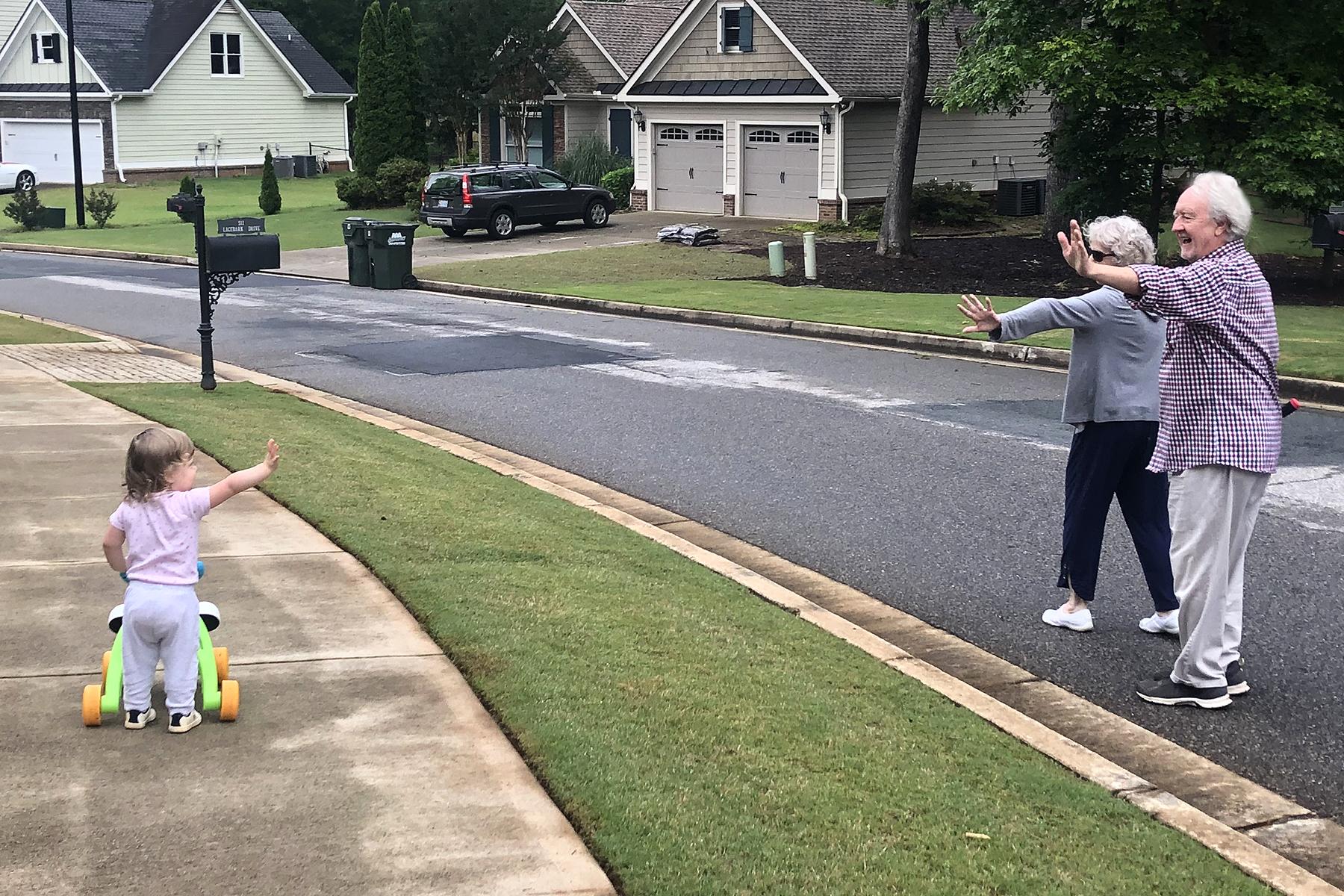For most of us, freedom and mobility are inextricably linked, and baby boomers have always shown that they will accept nothing short of freedom. At the same time, mobility is something most people take for granted. You don’t realize its importance until your own mobility is threatened by a sprain, a surgery, an accident.
“You have to reinvent yourself,” says Athens boomer Ron Baker. “You have to find ways to maintain mobility as you age.”
Baker lost his ability to walk after he fell while overseeing a construction site after dark. He has since adapted to a power chair and a customized vehicle that allows him to continue collecting art and attending concerts – two of his many passions. Now Baker also helps other people continue to live their lives despite physical disabilities as a sales associate at Custom Mobility.
Falling is so easy
Falls are the leading cause of fatal and nonfatal injuries among older adults, according to the CDC, with 25 percent of people over 65 reporting falls in any given year. When asked how boomers can maintain mobility, Allison Donatelli, a physical therapist with Piedmont Athens Regional, immediately stresses the importance of fall prevention. “The stats are staggering regarding hip fractures,” she says. “Typically, they result from a fall.”
And falls are largely preventable. Donatelli advises people to begin prevention efforts by reviewing and managing their medications. Keep one list of all medications and use one pharmacy to help prevent drug interactions that could impair balance. She also emphasizes simple steps like assessing your home for tripping hazards, getting routine vision checks, never wearing bifocals on stairs, staying active and wearing good shoes.
Shoes play a key role in maintaining mobility. Nowadays comfort and athletic shoes are stylish so don’t be afraid to shop for shoes that are easy on your feet. Brad Frink, manager of Athens Running Company, says that an overwhelming majority of his shop’s new clients are wearing shoes that are simply the wrong size. Most people’s feet get slightly larger as they age so don’t be shy about getting your foot measured. Also, find a shoe store that can assess your gait.
Just as a shoe salesman can help you find the right footwear, a car salesman can help you find the right vehicle to help keep you safe on the road. New features in automobiles are accommodating various physical impairments. The AAA has created a useful website to help older drivers find cars that may best suit their particular needs. At SeniorDriving.AAA.com/SmartFeatures, drivers can choose among typical limitations such as arthritic hands, diminished vision or limited upper body range of motion.
While the best way to assess your driving skills is through a consultation with an occupational therapist, the University of Florida’s Institute for Mobility, Activity and Participation has created a free screening tool to assess your fitness to drive. It is available at Fitnesstodrive.phhp.ufl.edu.
Pride goeth before a fall
Even those of us who avoid major injuries often encounter mobility impairments as we age. One of the most common is osteoarthritis of the joints, which affects 27 million Americans. This wear and tear can occur in any joint, but the knees and hips are most common because of the weight they bear. Osteoarthritis develops over time, and there is no known cure. The best way to prevent it is to avoid excess weight gain and to stay active while avoiding injuries.
In cases of severe osteoarthritis, doctors may recommend joint replacement. In the last 40 years, the number of these surgeries has skyrocketed. More than 7 million Americans are now living with an artificial knee or hip, according to the American Academy of Orthopedic Surgeons. While physical therapy helps with full recovery, Donatelli notes that it can take up to a year, and every rehabilitation is different, perhaps requiring the use of assistive devices.
Whether recovering from surgery or an injury, struggling with arthritis or some type of balance issue, don’t let your pride keep you from using a cane or walker if your doctor recommends it. Harvard Health reports 30-50 percent of people stop using assistive devices before they should, but these simple tools can improve stability, prevent falls and take the load off areas of pain. A physical therapist can help you choose a cane or walker and ensure you are using it properly.

Following a stroke, Jane Houston gave up her cane too soon and fell several times. Now she keeps a cane in her car and one in her house.
Jane Houston, 69, suffered a stroke five years ago, completed rehab, but stopped using her cane prematurely. After falling a few times, she realized her balance had diminished and decided to use a cane full-time. “I feel much more secure now,” she says. “It’s about more than looks.”
Canes are good for helping with balance but not for bearing a lot of weight. Walkers are the second line of support. Anna Roman, a sales associate at Care Medical on Prince Avenue, says Medicare covers the cost of a cane or basic walker, but there are extra expenses for a brake system or chair attachment. Regardless of which assistive device you might need, you should consult a doctor for a written prescription.
“Baby boomers have worn their bodies out,” says Baker. “They are pushing industries to create better mobility equipment.”
At his desk, Baker shows me a picture of a zero-turn-radius scooter that easily maneuvers around furniture. “Relationships are difficult enough without you damaging the family heirlooms. This equipment makes these transitions easier,” he says.
In addition to selling mobility products, Custom Mobility can help customers convert their vehicles to carry those products. However, Baker says people need to realize that insurance and Medicare don’t pay for vehicles, and not all vehicles can be converted.
Retired educator, John H. Davis, 73, got his minivan outfitted with a wheelchair lift, a transfer seat and hand controls. He doubled the cost of his car, but he says it was worth it. He’s able to get out of the house regularly to exercise at the YMCA, to attend classes at UGA’s Exercise Muscle Physiology Laboratory, and to participate at church and in the community.
After Davis was diagnosed with spine cancer 26 years ago, he slowly lost his ability to walk. At first, he walked with a cane, then two canes, then a walker and finally a power chair, which he’s been using for 15 years. He says his positive attitude, his wife’s help, and his faith have helped him adapt.
“We’re all put on this earth to glorify God. If all I have to do is sit in this wheelchair and smile, that’s easy!” Davis exclaims.
His humility belies his bravery and strength. While Davis says that Athens parking infrastructure is very accommodating to people with disabilities, he observes that other drivers often fail to park within marked spaces. That makes it difficult for him and others with mobility equipment to load and unload.
Baker agrees. “The number one problem is parking. The space between spaces is too narrow to deploy the ramp for a wheelchair.”
Baker tells a story about circling a lot at a local restaurant, unable to find a spot large enough for his equipment. And Davis recalls standing outside in the rain after church, waiting for someone to move a car so that Davis could get back into his van to go home.
“We look at this as being a minor thing: that a spot is too small to deploy a handicap ramp. That is a symptom of how our society is trying to hide itself from a practical need that we have as we age or become injured,” says Baker.
Despite enduring struggles that most of us cannot imagine, Davis says that he is constantly reassured by the goodness of strangers. “People are willing and determined to try to help you when you need help. I appreciate that so much,” he says.
Davis’s creed? “Be brave. Be stubborn. But don’t be so brave and stubborn that you hurt yourself. Know there’s always help if you need it.”![]()





The comments are closed.